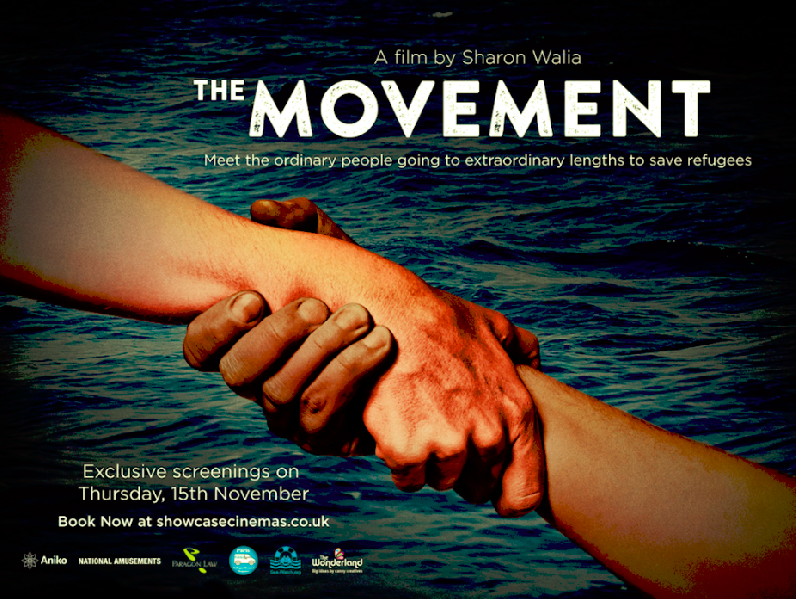The refugee crisis that was so dominant in the news 18 months back has not gone away. First time filmmaker and refugee worker Sharon Walia is determined to bring it to the forefront of the news again with her documentary The Movement.
Who is dealing with this crisis? Rather than the governments, it is ordinary people driven to extraordinary lengths to try to help and they, like the refugees they are trying to help, are drowning. In her film, Sharon works and speaks with volunteers and charity workers from France to Greece to Libya doing their best to help. “People are giving up their lives to do this. They’re not doing it for fun, because believe me it’s not fun,” she explained.
Skirting the dangerous Libyan coast, the squalid streets of Paris, and the hidden churches of Rome, The Movement was filmed over a year, and sheds an uncomfortable light on Libyan torture camps, global smuggling networks, and the war on refugee NGOs. Battling against these terrifying odds to save migrants on land, sea and from the air are the ordinary people trying to make a difference; the firefighter, the palliative care nurse, the pilot, the footballer. The Movement is their story.

Sharon shot the documentary entirely on her own, securing theatrical distribution through National Amusements – a major coup for a first time filmmaker. “To be honest I would have been crushed if I didn’t receive any distribution, because I’ve worked so so hard on it,” Sharon said.“If you have passion and a compelling story to tell, it is possible to make a theatrical film in a non-traditional way.”
Back when she started getting involved in working with refugees, “it wasn’t really fashionable” to do so. Working with refugees full time after finishing university, Sharon “was looking around at media reports, thinking that the way these kinds of issues were being reported was very very biased. It’s a lot better now, but back then around five years ago I thought it was pretty dire.”
After a masters in broadcast journalism, Sharon thought “well, if I’m any good at this, I’ll make refugee reporting my niche. I’d never picked up a camera before, never ever edited before. It was a big learning curve.”
Bigger than the challenge of singlehandedly creating this film was the emotional toll it took. “I don’t think I was mentally prepared for … seeing what the refugees are fleeing from,” Sharon said. “When I saw the first refugee boat, sinking, I was on a plane, and if we hadn’t reached that boat it would have been sunk in about 20-30 minutes. It looked so tiny from the air – the ocean is so vast and there’s just this tiny little boat. When I saw it it just really hit me, and I was holding the camera and trying to film it, but it really hit me. I didn’t think that it would hit me like that, seeing the crisis right in front of my eyes.”
On her hopes for the film, Sharon said: “I wanted to make the film accessible to your average person sitting at home watching the TV – they’ve probably never met a refugee before. I’m sure people who are interested in the crisis and in refugee rights will go and see the film, but I would really love for people like Nigel Farrage and people who read The Sun to be watching this. Those are the people I want to go and see it.”
The question this film leaves audiences with is what we can do to help. “There are so many ways to help,” said Sharon. “On this week of Remembrance, it’s important to remember the 1951 Refugee convention after WWII, where it was stated that we would never again have a crisis like that again. And here we are now, and it’s worse than it was then. The crisis is huge and it’s not going away, and it’s going to get worse and worse with global warming. All you have to do is look what’s happening in your local town – there’s so much happening and a lot if it is done by volunteers. Refugee Asylum Centres in your local areas are a great starting point.
“If you sit down and meet a person from another country – a refugee, a refused asylum seeker – I can guarantee that your perception will change. Meeting someone is enough to make someone feel welcome. If you wanted to go a step further and volunteer, that would make a world of difference.”
The Movement premieres in Nottingham on Monday 12th November followed by national screenings on Thursday 15th November at Showcase Cinemas.
For tickets please visit: https://www.showcasecinemas.co.uk/film-info/the-movement
